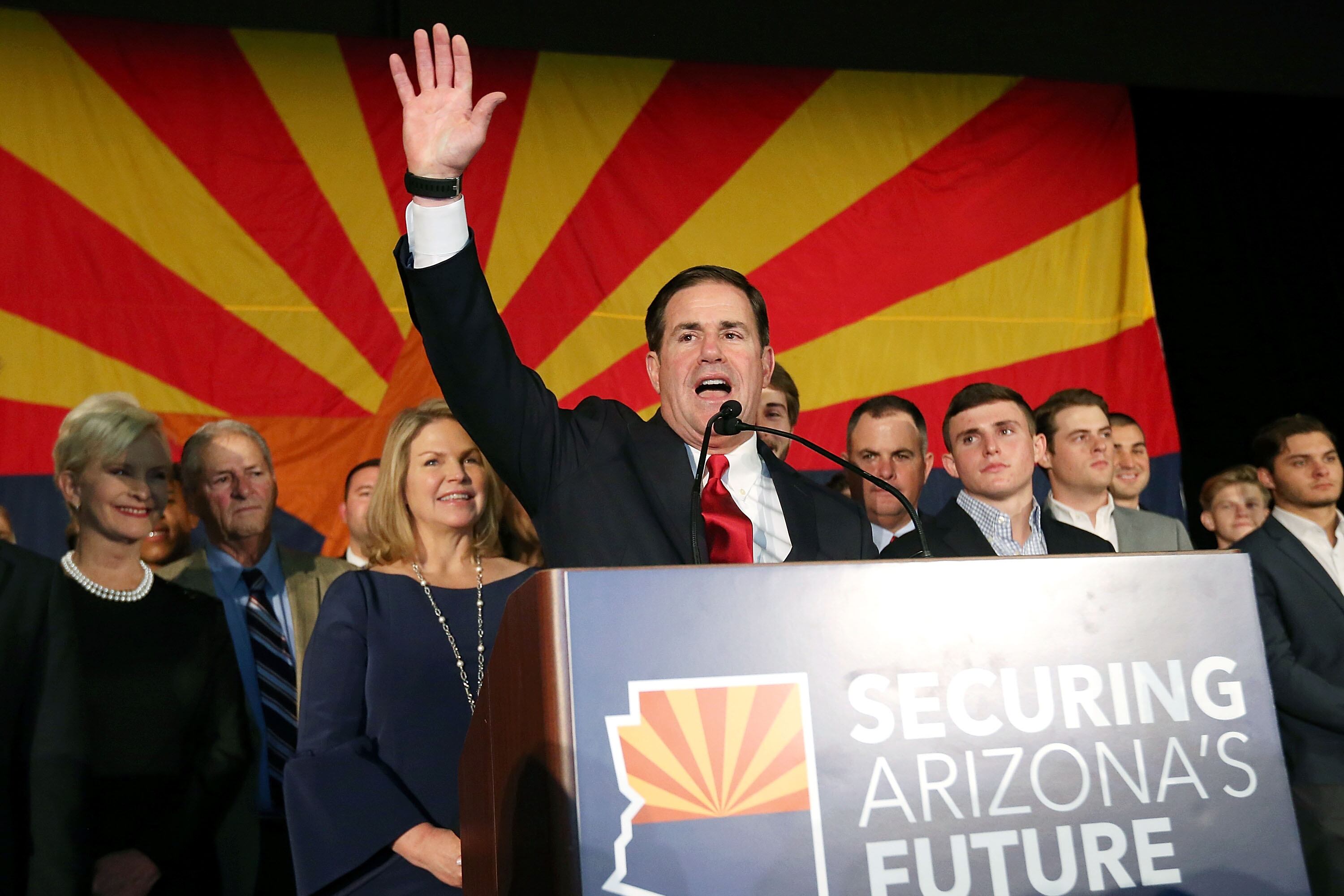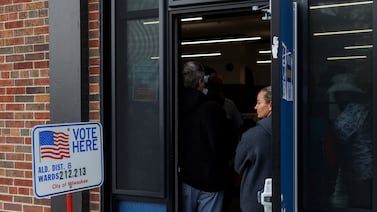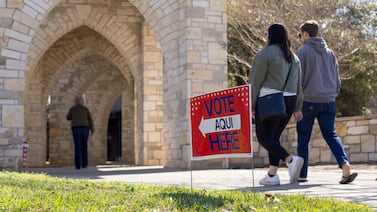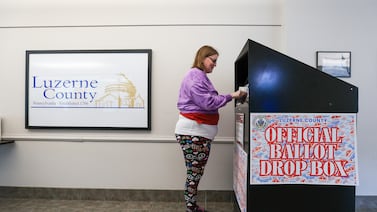A version of this post was originally distributed in Votebeat’s weekly newsletter. Sign up here.
Remember proof of citizenship laws? I can tell ya’, 31,000 people in Kansas do.
That’s how many people had their registration rejected over the three years when Kansas required voters to provide documentation proving their citizenship when registering to vote. That number, along with the fact that such laws violate the National Voter Registration Act, is why the Supreme Court in December 2020 refused to reverse a lower-court decision against Kansas that overturned the law.
But Arizona appears not to have heard the message as clearly as the Supreme Court intended, because after Republican officials there tried this many years ago, they are trying it again. The state has required those registering to vote in state elections to show documentary proof of citizenship since 2004, and in 2013 the Supreme Court ruled (for similar reasoning as above) that Arizona’s requirement was not permissible in federal elections. Notably, the late Antonin Scalia wrote the majority opinion, which was joined by six other justices. That’s not a close call.
“No matter what procedural hurdles a State’s own form imposes, the Federal Form guarantees that a simple means of registering to vote in federal elections will be available,” Scalia wrote. The NVRA requires that voters must be able to register to vote in federal elections using the National Voter Registration Application, which does not require documentary proof of citizenship.
And so, the state has had a dual registration process since that time, but that’s soon to change. Gov. Doug Ducey has signed a bill requiring any voter registering to vote in either type of election to show proof of citizenship. This is likely to significantly affect the 192,000 people in Arizona who were issued driver’s licenses prior to 1996, when proof of citizenship was not required to obtain a license. The state can conclude that those voters who registered using a driver’s license obtained after 1996, then, are citizens. The new law also requires voters to provide proof of their address when they register.
The timing of the change is a bit tricky. The Associated Press reports, “the bill would take effect 90 days after the end of the legislative session, which is likely to fall between the primary and general elections. Affected voters could vote legally in the Aug. 2 primary, would get notified their registration was at risk of cancellation if they didn’t prove their citizenship, and they’d have until Oct. 11 to fix the issue or miss their chance to vote in the general election.”
Legislators who cooked this up essentially admit that it is in violation of federal law and has previously been litigated throughout the U.S. court system. Still, the Supreme Court looks a heck of a lot different now than it did in 2013 — Amy Coney Barrett gives the conservatives a 6-3 majority — even if it resembles the one that declined to take up Kansas’s bid to do the same in late 2020. Progressive advocates fear that the state is attempting to get the more conservative court to overturn SCOTUS’s previous rulings and, indeed, have already sued the state over the law in federal court.
Perhaps I’m optimistic, but I really don’t see the court reversing precedent. (Let me know if you disagree.) I sat through two weeks of former Secretary of State Kris Kobach’s battle with the ACLU over a nearly identical law in Kansas, and the reasoning offered in Arizona — grave concern over the possibility of noncitizens registering to vote — was baseless there, and it is almost certainly baseless in Arizona. Here’s some of my reporting from 2018, featuring the testimony of Kobach’s expert witness, political science professor Jesse Richman, who had been hired to estimate the number of noncitizens on its rolls:
Using samples as small as a single voter, [Richmond] produced surveys with wildly different estimates of non-citizen registration in the state. The multiple iterations confused everyone in the courtroom.
“For the record, how many different data sources have you provided?’ [Federal District Court Judge Julie] Robinson interjected in the middle of one Richman answer. “You provide a range of, like, zero to 18,000 or more.”
“I sense the frustration,” Richman responded, before offering a winding explanation of the multiple data sources and surveys he’d used to arrive at a half-dozen different estimates. Robinson cut him off. “Maybe we need to stop here,” she said.
“Your honor, let me finish answering your question,” he said.
“No, no. I’m done,” she responded, as he continued to protest. “No. Dr. Richman, I’m done.”
To refute Richman’s numbers, the ACLU called on Harvard’s [Stephen] Ansolabehere, whose data Richman had relied on in the past. Ansolabehere testified that Richman’s sample sizes were so small that it was just as possible that there were no non-citizens registered to vote in Kansas as 18,000. “There’s just a great deal of uncertainty with these estimates,” he said.
[ACLU attorney Dale] Ho asked if it would be accurate to say that Richman’s data “shows a rate of non-citizen registration in Kansas that is not statistically distinct from zero?”
“Correct.”
Note Judge Robinson’s frustration and incredulity. A George W. Bush appointee, Robinson has never been accused of being a lefty. Still, like Scalia, she could see the problem from a mile away. The reason Richman relied on such tiny sample sizes and arrived at such a wide range of estimates is simple: There is not enough data to do such an analysis with any reliability, because there aren’t enough noncitizens registered to produce such data. Arizona may attempt to prove something similar, and Republicans have already hinted that this is their play. In signing the law, Ducey said the crux of his worry rested on the more than 11,000 voters who’d registered in 2020 without providing proof of citizenship.
That’s hardly proof of wrongdoing. As established, Arizonans who register to vote for federal elections — which is, one suspects, what most of those voters intended to do given that they registered in a federal election year — are not required to provide that proof. And, as established by the 31,000 voters who didn’t provide such proof in Kansas — a state with a population less than half of Arizona’s — few people walk around with their birth certificate or their passport. And if their primary purpose in registering was to vote in the high-stakes presidential election, it’s unlikely it would be their priority to return with such proof so that they could vote in state elections that would not be held for some time.
Ducey can throw out misleading numbers on television and in the newspaper if he likes, but the same numbers won’t fly in federal court. Vague suspicion of wrongdoing buoyed by misleading statistics is not evidence, and the strictures of the courtroom and evidentiary standards will not abide the same type of demagoguery that is frequently accepted by a large portion of the public.
Back Then
I’ve said this before, but I want to drive home that the Constitution does not set citizenship requirements for voting. Truly, it does not. Noncitizens voted legally in Arkansas, for example, as late as the 1920s. States began to ban noncitizens from voting — which had previously been encouraged by territories and states as a way to embrace American democratic ideals — in the midst of World War I, when xenophobia raged. In recent years, cities — even ones as big as New York City — have legalized noncitizen voting for municipal elections.
Big Number of the Week
By Brianna Fisher, Votebeat fellow
On Monday, President Biden released his 2023 budget, and it proposes $10 billion for elections assistance. The amount would be distributed to each state over 10 years. Biden does not specify how that should be broken down, other than noting that the money should include grants to increase access and security.
In addition, Biden proposed $5 billion more for the United States Postal Service, to expand delivery capacity in underserved areas and support for vote-by-mail, including making ballots postage-free and reducing the cost of other election-related mail (like voter guides) for jurisdictions and voters.
Biden also proposed an additional $250 million for “Election Innovation Grants.” These grants could be used by states to hire new election officials and poll workers and help buy new secure voting systems.
Republicans might not be on board. They cite the lack of accountability for the money disbursed to election officials since 2018, which they say has yet to be fully spent. “Throwing billions at the [Election Assistance Commission] without increased transparency in the grants process is not being good stewards of taxpayer dollars and does not make our elections more secure,” said Rep. Rodney Davis of Illinois, the top Republican on the House Administration Committee — which provides oversight to the EAC. EAC Commissioner Thomas Hicks this money would help states update their voting systems over a longer period of time, “rather than quickly using whatever money Congress provides in a given year.”
In Other Voting News
- In a decision that will almost certainly be appealed, a federal judge has ruled that multiple parts of the 2021 Florida voting law are unconstitutional. U.S. District Judge Mark Walker said voting rights were “under siege” and banned the state from enacting changes to drop boxes, third-party voter registration, or efforts to give voters things like food and water while standing in line without approval by the court.
- Reporter Rachel M. Cohen is out with an in-depth piece on the Brennan Center’s impact on the Democrats’ approach to voting laws, and specifically their failure to pass meaningful election funding.
- Journalist Spenser Mestel has a similarly eyebrow-raising piece in Bolts, detailing the bevy of right-wing conspiracy theories threatening to starve counties of even more funding. The threats to election funding are coming from various directions.
- El Paso Matters published a deep analysis of local voters whose ballots were rejected during the Texas primaries as a result of the state’s new requirement to include identification numbers on the ballot envelopes. “The new law disenfranchised 15% of El Paso’s absentee voters, who are some of El Paso’s longest-tenured and most active voters, based on an El Paso Matters analysis of county election records,” wrote reporter Molly Smith.
- An effort by a failed Republican rival candidate in Green Bay, Wisconsin, is attempting to force a recall of Mayor Eric Gengrich, charging him with having Green Bay accept donations by third parties to administer the 2020 election. The grants, largely from the Center for Tech and Civic Life, were funded by the Chan Zuckerberg Initiative. Ironically, the recall event was held as an event on Facebook.
- Elsewhere in Wisconsin, clerks are unsure how to handle delivery of absentee ballots because of the state’s ambiguous laws. Although delivering someone else’s ballot (sometimes called “ballot harvesting”) is either firmly legal or illegal in most states, Wisconsin’s laws are unclear. The state election commission had issued guidance saying it is legal, but a rightwing group has sued and forced the commission to rescind that guidance. So who knows!
- And finally, also in Wisconsin, House Speaker Robin Vos has been held in contempt by a Dane County court for failing to release documents related to the Republican-led review of the 2020 election in the state. Saying that Vos had demonstrated “a collective and abject disregard for the court’s order,” the judge has ordered Vos to turn the documents over — per a request by American oversight — within 14 days or be subject to a $1,000 a day fine.
- Also facing contempt charges are the members of the Ohio Redistricting Commission. The Ohio Supreme Court has (again) asked the commission to respond to charges it should be held in contempt given that the fourth map that was passed looks basically identical to the third map, which the court ruled had been unconstitutionally gerrymandered by Republicans.
- Fulton County, Georgia, has found itself in a bit of a pickle. The Board of Elections’ only candidate to replace the outgoing elections director was Derek Bowens, currently the elections director in Durham County, N.C., but he has now withdrawn his name. The county is now without an election director less than 50 days out from the state primary.
Good News of the Week
People! We love hearing from election officials! And this week we heard from Jean Kaczmarek, DuPage County clerk in Illinois. She told us that the Illinois State Board of Elections is stacked this year with ballot objections (in which candidates object to parts of other candidates’ nominating petitions, like the required signatures) — around 70 percent more than average. Not so in her county, where not a single petition challenge has been filed. That’s unprecedented. Why the success? Because she and her staff have simplified and clarified the forms for candidates and have offered workshops on how to avoid ballot objections. The Daily Herald editorial board thinks more counties should do the same. Well done, Jean.
Have you done something freakin’ cool in your county? Tell us about it.





